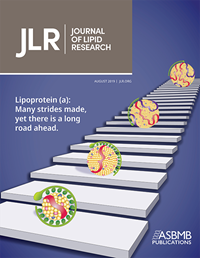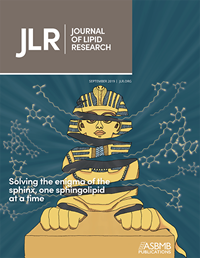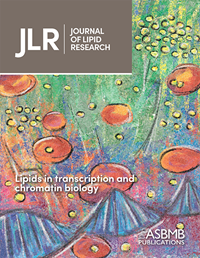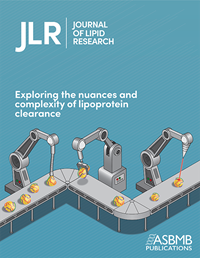JLR junior associate editors organize virtual issues
The junior associate editors of the Journal of Lipid Research have organized four virtual issues highlighting cutting-edge research published by the journal.

Lipoprotein (a): Many strides made, yet there is a long road ahead
In this virtual issue, the JLR highlights early-career researchers pushing our understanding of lipoprotein (a) pathophysiology forward. According to Gissette Reyes-Soffer of the Columbia University Irving Medical Center, a better grasp of lipoprotein (a) is necessary to improve risk evaluations and targeted therapies for cardiovascular disease and diabetes.
The cover art depicts the Lp(a) particle following the steps of a walking path, increasing in size as the road goes into infinity. Read the collection.

Solving the enigma of the sphinx, one sphingolipid at a time
Recent studies have advanced our understanding of sphingolipids and their biologic roles in health and disease. This virtual issue, organized by Rotonya Carr of the University of Pennsylvania Perelman School of Medicine, also highlights both established and new investigators in the field who undoubtedly are the future of sphingolipid research.
The cover art features the structures of several sphingolipids being freed as the Sphinx unravels. Read the collection.
Exploring the nuances and complexity of lipoprotein clearance
This virtual issue, assembled by Brandon Davies of the University of Iowa Carver College of Medicine, highlights studies that advance our understanding of lipoprotein clearance and illustrate the breadth and diversity of lipoprotein-clearance research.
The cover art depicts different mechanisms acting to clear and modify lipoproteins on an assembly line representing the circulation. Read the collection.

Lipids in transcription and chromatin biology
Ray Blind of the Vanderbilt University School of Medicine put together a virtual issue showcasing recent papers showing that lipids actively participate in epigenetic reprogramming, chromatin modifications and nucleosome structure, along with their more well-established roles in splicing, RNA export and transcriptional regulation.
The cover art is an abstract representation of nuclear lipids participating in the regulation of transcription and chromatin biology. Read the collection.
Enjoy reading ASBMB Today?
Become a member to receive the print edition four times a year and the digital edition monthly.
Learn moreGet the latest from ASBMB Today
Enter your email address, and we’ll send you a weekly email with recent articles, interviews and more.
Latest in Science
Science highlights or most popular articles

Avoiding common figure errors in manuscript submissions
The three figure issues most often flagged during JBC’s data integrity review are background signal errors, image reuse and undeclared splicing errors. Learn how to avoid these and prevent mistakes that could impede publication.

Ragweed compound thwarts aggressive bladder and breast cancers
Scientists from the University of Michigan reveal the mechanism of action of ambrosin, a compound from ragweed, selectively attacks advanced bladder and breast cancer cells in cell-based models, highlighting its potential to treat advanced tumors.

Lipid-lowering therapies could help treat IBD
Genetic evidence shows that drugs that reduce cholesterol or triglyceride levels can either raise or lower inflammatory bowel disease risk by altering gut microbes and immune signaling.

Key regulator of cholesterol protects against Alzheimer’s disease
A new study identifies oxysterol-binding protein-related protein 6 as a central controller of brain cholesterol balance, with protective effects against Alzheimer’s-related neurodegeneration.

From humble beginnings to unlocking lysosomal secrets
Monther Abu–Remaileh will receive the ASBMB’s 2026 Walter A. Shaw Young Investigator Award in Lipid Research at the ASBMB Annual Meeting, March 7-10 in Washington, D.C.

Chemistry meets biology to thwart parasites
Margaret Phillips will receive the Alice and C. C. Wang Award in Molecular Parasitology at the ASBMB Annual Meeting, March 7-10 in Washington, D.C.

